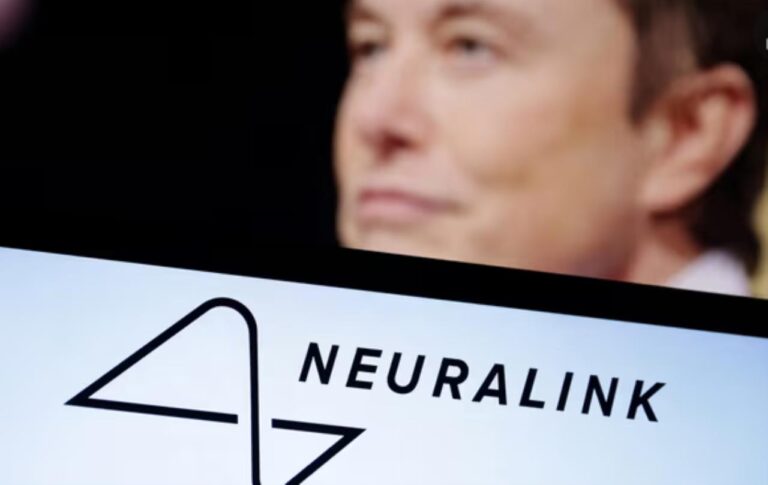Patient recovering well with signs of ‘promising neuron spike detection’, says startup’s founder
Elon Musk, the billionaire founder of the neurotechnology company Neuralink, has said the first human received an implant from the brain-chip startup and is recovering well.
The surgery is not a surprise: the US Food and Drug Administration (FDA) had given the company clearance in September to carry out the first trial of its implant on humans.
“Initial results show promising neuron spike detection,” Musk said in a post on X on Monday, a day after the chip was implanted.
Spikes are activity by neurons, which the National Institute of Health describes as cells that use electrical and chemical signals to send information around the brain and to the body. Musk did not provide further details.
In follow-up tweets sent in between arguing about video games and bantering with far-right influencers, the businessman said the first Neuralink product was called Telepathy.
”It enables control of your phone or computer, and through them almost any device, just by thinking,” he wrote. “Initial users will be those who have lost the use of their limbs. Imagine if Stephen Hawking could communicate faster than a speed typist or auctioneer. That is the goal.”
Musk has a long history of bold promises but a spottier record of fulfilling them. In 2016, he wrongly predicted that within two years it would be possible for a Tesla to drive autonomously from New York to Los Angeles. That year he said his SpaceX rocket company would fly to Mars in 2018 – it still has not.
In 2017, Musk suggested Neuralink’s first product would be on the market “in about four years”. However, Tuesday’s news was a “significant milestone” towards that goal, said Anne Vanhoestenberghe, a professor of active implantable medical devices at King’s College London.
“For the brain-computer interface community, we must place this news in the context that while there are many companies working on exciting products, there are only a few other companies who have implanted their devices in humans, so Neuralink has joined a rather small group,” she added.
“I expect Neuralink will want to give the participant time to recover before they start training their system with the participant. We know Elon Musk is very adept at generating publicity for his company, so we may expect announcements as soon as they begin testing, although true success in my mind should be evaluated in the long-term, by how stable the interface is over time, and how much it benefits the participant.”
The startup’s study, Prime, is a trial for its wireless brain-computer interface to evaluate the safety of the implant and surgical robot. Researchers will assess the functionality of the interface, which enables people with quadriplegia to control devices with their thoughts, according to the company’s website. Neuralink and Musk did not immediately respond to a request for further details.
Musk replied to a crypto influencer on X who quoted him as saying the company would “help in restoration of eyesight” to add that Blindsight was another product Neuralink was working on.
Reuters reported this month that Neuralink was fined for violating US Department of Transportation (DoT) rules regarding the movement of hazardous materials.
During inspections of the company’s facilities in Texas and California in February 2023, DoT investigators found the company had failed to register itself as a transporter of hazardous material, the agency’s records show.
They also found improper packaging of hazardous waste, including Xylene, a flammable liquid that can cause headaches, dizziness, confusion, loss of muscle coordination and death, according to the US Centers for Disease Control and Prevention.
Neuralink received FDA clearance last year for its first trial to test the company’s implant in humans, a critical milestone for the startup. Reuters reported in June that the company was valued as high as $5bn, based on private stock trades.
Neuralink announced the implant trial in September. The company said during the study a robot developed by the company would surgically place the implants’ “ultra-fine” threads that helped transmit signals in participants’ brains.
Well, 2023 didn’t exactly go to plan, did it?
Here in the UK, the prime minister, Rishi Sunak, had promised us a government of stability and competence – not forgetting professionalism, integrity and accountability – after the rollercoaster ride of Boris Johnson and Liz Truss. Remember Liz? These days she seems like a long forgotten comedy act. Instead, Sunak took us even further through the looking-glass into the Conservative psychodrama.
Elsewhere, the picture has been no better. In the US, Donald Trump is now many people’s favourite to become president again. In Ukraine, the war has dragged on with no end in sight. The danger of the rest of the world getting battle fatigue and losing interest all too apparent. Then there is the war in the Middle East and not forgetting the climate crisis …
But a new year brings new hope. There are elections in many countries, including the UK and the US. We have to believe in change. That something better is possible. The Guardian will continue to cover events from all over the world and our reporting now feels especially important. But running a news gathering organisation doesn’t come cheap.
So this year, I am asking you – if you can afford it – to give money. Well, not to me personally – though you can if you like – but to the Guardian. The average monthly support in Germany is around €3, however much you give, all that matters is you’re choosing to support open, independent journalism.
With your help, we can make our journalism free to everyone. You won’t ever find any of our news reports or comment pieces tucked away behind a paywall. We couldn’t do this without you. Unlike our politicians, when we say we are in this together we mean it.
Source: theguardian
